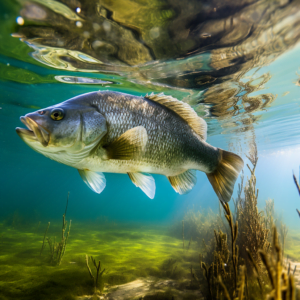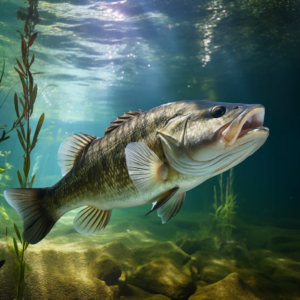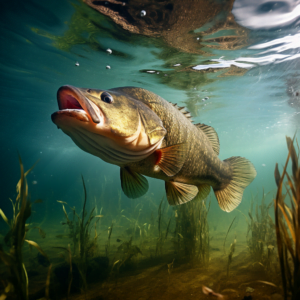So, have you ever wondered what eats a largemouth bass? You know, those big, feisty fish that put up a good fight when you reel them in? Well, it turns out that even the mighty largemouth bass has its own predators in the underwater world. In this article, we’re going to delve into the fascinating topic of the content predators that prey on our beloved largemouth bass. And trust me, you’ll be surprised by some of the creatures that consider these fish a delicious meal.
When it comes to largemouth bass, they may be at the top of the food chain in their natural habitat, but that doesn’t mean they don’t have their own set of predators. Let’s start with birds. Yes, you read that right, birds! Large wading birds like herons and egrets are known to feast on unsuspecting largemouth bass. These birds use their sharp beaks to snatch the fish right out of the water, making for an impressive meal.
But it’s not just birds that pose a threat to our favorite fish. Other predatory fish also love a good largemouth bass snack. Pike, muskies, and even other bass have been known to prey on their smaller cousins. These powerful swimmers can easily overpower a largemouth bass and make a quick meal out of them.
So, as you can see, the largemouth bass, despite its impressive size and strength, is not without its own set of dangers in the animal kingdom. In this article, we’ll explore these predators in more detail and learn how they impact the population of largemouth bass in various ecosystems. So, buckle up and get ready to dive deep into the world of the content predators of the largemouth bass.
Predators of the Largemouth Bass
The largemouth bass is an iconic freshwater fish that is not only sought after by anglers but also serves as a vital component of the aquatic ecosystem. However, even though it may seem like the big fish in the pond, the largemouth bass is not without its own set of predators. In this article, we will explore the various natural predators of the largemouth bass and discuss how these predators impact the population of this beloved fish.
Natural Predators
In the wild, the largemouth bass has to contend with a number of natural predators that are always on the lookout for a tasty meal. These predators come from a variety of different groups, including birds of prey, aquatic predators, reptiles and amphibians, and even mammals.
Birds of Prey
One group of predators that pose a threat to the largemouth bass are birds of prey. These predatory birds, such as ospreys and eagles, have sharp eyes and strong talons that make them formidable hunters. They are able to spot a bass swimming just beneath the water’s surface and swoop down to catch their prey with precision.
Aquatic Predators
In addition to birds of prey, the largemouth bass also has to contend with a number of aquatic predators. Fish such as pike, muskellunge, and walleye are known to prey on bass, especially smaller individuals. These predators are not only quick swimmers but also possess sharp teeth that allow them to seize and consume their prey in a matter of seconds.
Reptiles and Amphibians
Reptiles and amphibians also factor into the list of natural predators of the largemouth bass. Snakes, such as water moccasins, and carnivorous amphibians, like bullfrogs, are known to prey on smaller bass when they have the opportunity. These predators often lie in wait near the water’s edge before ambushing their unsuspecting prey.
Mammals
Mammals, too, play a role in the predation of largemouth bass. Animals such as raccoons and otters are skilled hunters that have been observed preying on bass in lakes and ponds. These clever creatures are known to use their dexterity to overturn rocks and find hiding bass or to dive underwater and snatch a bass swimming nearby.
Human Predation
While natural predators play a significant role in keeping the largemouth bass population in check, human predation also impacts the population of this fish. The popularity of sport fishing has led to increased angling pressure on largemouth bass. While catch-and-release practices have become more prevalent, human angling can still have an impact on the overall population.
Cannibalism
Interestingly enough, the largemouth bass is not immune to predation from its own kind. Cannibalism is not uncommon in bass populations, especially when food resources are scarce. Larger, older bass may prey upon smaller, younger bass as a means of survival. This cannibalism can further impact the population dynamics of the species.
Competitors for Resources
Predation is not the only factor that affects the largemouth bass population. Competition for resources, such as food and habitat, can also impact the abundance and distribution of this fish. Other species, such as bluegill and sunfish, may compete with bass for the same food sources, leading to decreased growth and survival rates.
Effects on Largemouth Bass Population
The combined impact of natural predators, human angling, cannibalism, and competition for resources can have significant effects on the largemouth bass population. If predation and competition become too intense, it can result in reduced recruitment and overall population decline. In contrast, when predation and competition are balanced, the largemouth bass population can thrive.
Conclusion
As the largemouth bass navigates the waters of its freshwater habitat, it faces an array of formidable predators. From birds of prey to aquatic predators, reptiles, amphibians, and mammals, this fish must constantly be on high alert to evade becoming a meal. Additionally, human angling and competition for resources further influence the population dynamics of the largemouth bass. Understanding the various predators of this fish is vital in ensuring its long-term survival and the overall health of freshwater ecosystems. By working towards maintaining a balanced ecosystem, we can continue to appreciate and enjoy the beauty and thrill of catching a largemouth bass for many generations to come.




